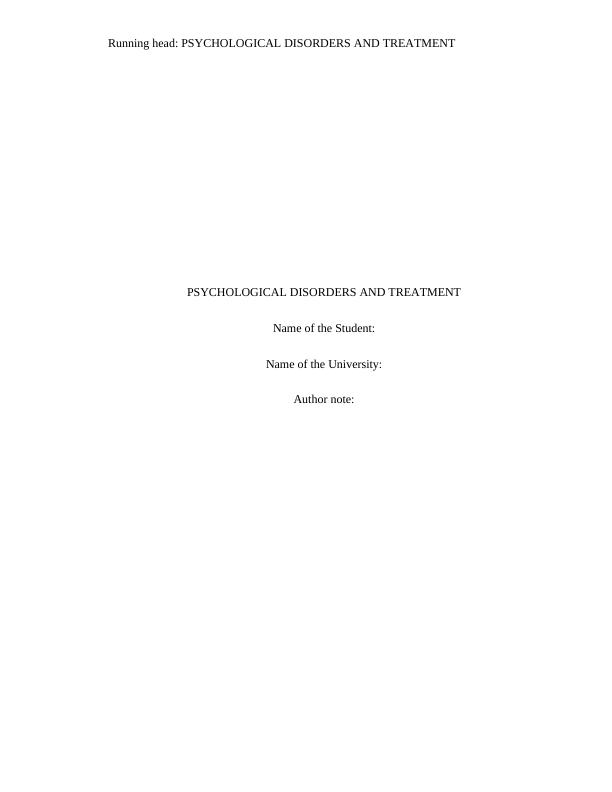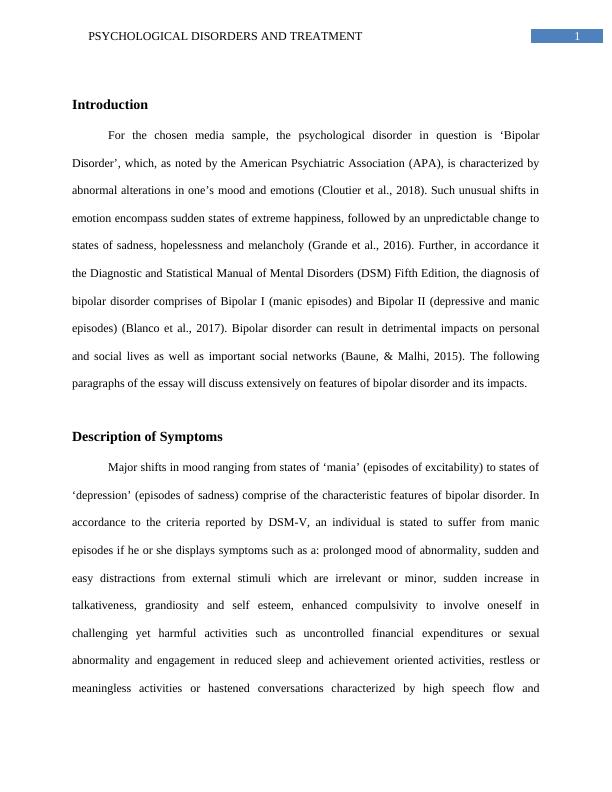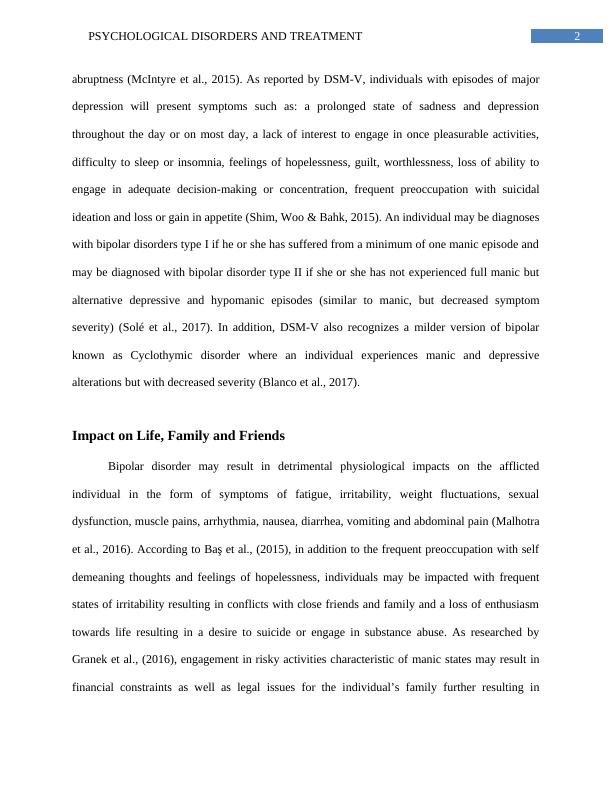Psychological Disorders and Treatment
Added on 2023-04-06
8 Pages1420 Words193 Views
Running head: PSYCHOLOGICAL DISORDERS AND TREATMENT
PSYCHOLOGICAL DISORDERS AND TREATMENT
Name of the Student:
Name of the University:
Author note:
PSYCHOLOGICAL DISORDERS AND TREATMENT
Name of the Student:
Name of the University:
Author note:

1PSYCHOLOGICAL DISORDERS AND TREATMENT
Introduction
For the chosen media sample, the psychological disorder in question is ‘Bipolar
Disorder’, which, as noted by the American Psychiatric Association (APA), is characterized by
abnormal alterations in one’s mood and emotions (Cloutier et al., 2018). Such unusual shifts in
emotion encompass sudden states of extreme happiness, followed by an unpredictable change to
states of sadness, hopelessness and melancholy (Grande et al., 2016). Further, in accordance it
the Diagnostic and Statistical Manual of Mental Disorders (DSM) Fifth Edition, the diagnosis of
bipolar disorder comprises of Bipolar I (manic episodes) and Bipolar II (depressive and manic
episodes) (Blanco et al., 2017). Bipolar disorder can result in detrimental impacts on personal
and social lives as well as important social networks (Baune, & Malhi, 2015). The following
paragraphs of the essay will discuss extensively on features of bipolar disorder and its impacts.
Description of Symptoms
Major shifts in mood ranging from states of ‘mania’ (episodes of excitability) to states of
‘depression’ (episodes of sadness) comprise of the characteristic features of bipolar disorder. In
accordance to the criteria reported by DSM-V, an individual is stated to suffer from manic
episodes if he or she displays symptoms such as a: prolonged mood of abnormality, sudden and
easy distractions from external stimuli which are irrelevant or minor, sudden increase in
talkativeness, grandiosity and self esteem, enhanced compulsivity to involve oneself in
challenging yet harmful activities such as uncontrolled financial expenditures or sexual
abnormality and engagement in reduced sleep and achievement oriented activities, restless or
meaningless activities or hastened conversations characterized by high speech flow and
Introduction
For the chosen media sample, the psychological disorder in question is ‘Bipolar
Disorder’, which, as noted by the American Psychiatric Association (APA), is characterized by
abnormal alterations in one’s mood and emotions (Cloutier et al., 2018). Such unusual shifts in
emotion encompass sudden states of extreme happiness, followed by an unpredictable change to
states of sadness, hopelessness and melancholy (Grande et al., 2016). Further, in accordance it
the Diagnostic and Statistical Manual of Mental Disorders (DSM) Fifth Edition, the diagnosis of
bipolar disorder comprises of Bipolar I (manic episodes) and Bipolar II (depressive and manic
episodes) (Blanco et al., 2017). Bipolar disorder can result in detrimental impacts on personal
and social lives as well as important social networks (Baune, & Malhi, 2015). The following
paragraphs of the essay will discuss extensively on features of bipolar disorder and its impacts.
Description of Symptoms
Major shifts in mood ranging from states of ‘mania’ (episodes of excitability) to states of
‘depression’ (episodes of sadness) comprise of the characteristic features of bipolar disorder. In
accordance to the criteria reported by DSM-V, an individual is stated to suffer from manic
episodes if he or she displays symptoms such as a: prolonged mood of abnormality, sudden and
easy distractions from external stimuli which are irrelevant or minor, sudden increase in
talkativeness, grandiosity and self esteem, enhanced compulsivity to involve oneself in
challenging yet harmful activities such as uncontrolled financial expenditures or sexual
abnormality and engagement in reduced sleep and achievement oriented activities, restless or
meaningless activities or hastened conversations characterized by high speech flow and

2PSYCHOLOGICAL DISORDERS AND TREATMENT
abruptness (McIntyre et al., 2015). As reported by DSM-V, individuals with episodes of major
depression will present symptoms such as: a prolonged state of sadness and depression
throughout the day or on most day, a lack of interest to engage in once pleasurable activities,
difficulty to sleep or insomnia, feelings of hopelessness, guilt, worthlessness, loss of ability to
engage in adequate decision-making or concentration, frequent preoccupation with suicidal
ideation and loss or gain in appetite (Shim, Woo & Bahk, 2015). An individual may be diagnoses
with bipolar disorders type I if he or she has suffered from a minimum of one manic episode and
may be diagnosed with bipolar disorder type II if she or she has not experienced full manic but
alternative depressive and hypomanic episodes (similar to manic, but decreased symptom
severity) (Solé et al., 2017). In addition, DSM-V also recognizes a milder version of bipolar
known as Cyclothymic disorder where an individual experiences manic and depressive
alterations but with decreased severity (Blanco et al., 2017).
Impact on Life, Family and Friends
Bipolar disorder may result in detrimental physiological impacts on the afflicted
individual in the form of symptoms of fatigue, irritability, weight fluctuations, sexual
dysfunction, muscle pains, arrhythmia, nausea, diarrhea, vomiting and abdominal pain (Malhotra
et al., 2016). According to Baş et al., (2015), in addition to the frequent preoccupation with self
demeaning thoughts and feelings of hopelessness, individuals may be impacted with frequent
states of irritability resulting in conflicts with close friends and family and a loss of enthusiasm
towards life resulting in a desire to suicide or engage in substance abuse. As researched by
Granek et al., (2016), engagement in risky activities characteristic of manic states may result in
financial constraints as well as legal issues for the individual’s family further resulting in
abruptness (McIntyre et al., 2015). As reported by DSM-V, individuals with episodes of major
depression will present symptoms such as: a prolonged state of sadness and depression
throughout the day or on most day, a lack of interest to engage in once pleasurable activities,
difficulty to sleep or insomnia, feelings of hopelessness, guilt, worthlessness, loss of ability to
engage in adequate decision-making or concentration, frequent preoccupation with suicidal
ideation and loss or gain in appetite (Shim, Woo & Bahk, 2015). An individual may be diagnoses
with bipolar disorders type I if he or she has suffered from a minimum of one manic episode and
may be diagnosed with bipolar disorder type II if she or she has not experienced full manic but
alternative depressive and hypomanic episodes (similar to manic, but decreased symptom
severity) (Solé et al., 2017). In addition, DSM-V also recognizes a milder version of bipolar
known as Cyclothymic disorder where an individual experiences manic and depressive
alterations but with decreased severity (Blanco et al., 2017).
Impact on Life, Family and Friends
Bipolar disorder may result in detrimental physiological impacts on the afflicted
individual in the form of symptoms of fatigue, irritability, weight fluctuations, sexual
dysfunction, muscle pains, arrhythmia, nausea, diarrhea, vomiting and abdominal pain (Malhotra
et al., 2016). According to Baş et al., (2015), in addition to the frequent preoccupation with self
demeaning thoughts and feelings of hopelessness, individuals may be impacted with frequent
states of irritability resulting in conflicts with close friends and family and a loss of enthusiasm
towards life resulting in a desire to suicide or engage in substance abuse. As researched by
Granek et al., (2016), engagement in risky activities characteristic of manic states may result in
financial constraints as well as legal issues for the individual’s family further resulting in

End of preview
Want to access all the pages? Upload your documents or become a member.
Related Documents
Mental Health - Bipolar Disorderlg...
|17
|4429
|63
Bipolar Disorder: Symptoms, Risks, and Effective Carelg...
|9
|2529
|34
Acute Care Mental Health: Assessment, Formulation, and Treatmentlg...
|11
|2900
|59
Nursing Care and Recovery Plan for Bipolar Affective Disorderlg...
|21
|3449
|109
Bipolar Disorder: Symptoms, Causes, Diagnosis, Treatment and Preventionlg...
|9
|1576
|172
Effects of Bipolar Disorder on Cognitionlg...
|7
|1995
|78
